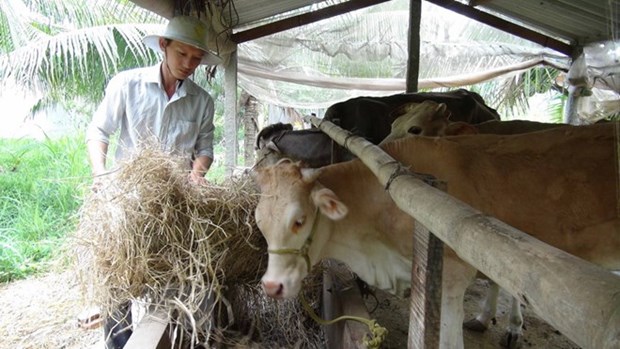Husbandry sector curbs use of banned substances
The use of banned substances in animal husbandry has been curbed in the first quarter of this year, the National Agro-Forestry-Fisheries Quality Assurance Department (NAFIQAD) said on April 10.
 Illustrative image (Source: VNA)
Illustrative image (Source: VNA) Hanoi (VNA) – The use
of banned substances in animal husbandry has been curbed in the first quarter
of this year, the National Agro-Forestry-Fisheries Quality Assurance Department
(NAFIQAD) said at a thematic conference on food quality and safety on April 10.
According to NAFIQAD director Nguyen Nhu Tiep, the rate of contamination among meat samples has reduced remarkably compared to 2017.
In a large-scale inspection conducted by central agencies and 39 out of 63 provinces and centrally-run cities in the first quarter, no Salbutamol traces were found in all 145 meat samples and 678 samples of animal urine.
Only one out of 418 taken samples of meat (0.24 percent) was found to contain traces of chemicals and antibiotic exceeding permitted level, down from 0.63 percent in 2017.
The rate of samples containing pesticides exceeding permitted level was 0.51 percent (three out of 594 taken samples), slightly lower than the 0.6 percent recorded in 2017.
However, the rate of contamination of chemical and antibiotic in aquatic product increased, with 24 out of 819 samples found breaking the permissible level, or 2.93 percent, up from 0.89 percent recorded last year.
In the first quarter, agencies under the Ministry of Agriculture and Rural Development (MARD) coordinated with other agencies and local administrations to conduct regular and surprise inspections of agro-forestry-fishery production and business establishment.
“Relevant agencies at both central and local levels have strictly punished those responsible for the violations of food safety regulations,” Tiep said.
Besides, agencies responsible for food safety also worked to address obstacles to the export of agro-forestry-fishery products, including holding talks with inspection teams from Japan, Australia, the US, Canada and Saudi Arabia on food safety in agro-fishery production and trading.
The agencies have undertaken measures to address technical barriers in order to maintain and expand the export of agro-fishery products.
Director Tiep said in the remaining months of this year, the MARD will continue to instruct drastic measures to ensure food safety, mainly targeting fresh products, small-scale slaughterhouses and small traders, and the use of pesticide and antibiotic in agricultural production and aquaculture.-VNA
According to NAFIQAD director Nguyen Nhu Tiep, the rate of contamination among meat samples has reduced remarkably compared to 2017.
In a large-scale inspection conducted by central agencies and 39 out of 63 provinces and centrally-run cities in the first quarter, no Salbutamol traces were found in all 145 meat samples and 678 samples of animal urine.
Only one out of 418 taken samples of meat (0.24 percent) was found to contain traces of chemicals and antibiotic exceeding permitted level, down from 0.63 percent in 2017.
The rate of samples containing pesticides exceeding permitted level was 0.51 percent (three out of 594 taken samples), slightly lower than the 0.6 percent recorded in 2017.
However, the rate of contamination of chemical and antibiotic in aquatic product increased, with 24 out of 819 samples found breaking the permissible level, or 2.93 percent, up from 0.89 percent recorded last year.
In the first quarter, agencies under the Ministry of Agriculture and Rural Development (MARD) coordinated with other agencies and local administrations to conduct regular and surprise inspections of agro-forestry-fishery production and business establishment.
“Relevant agencies at both central and local levels have strictly punished those responsible for the violations of food safety regulations,” Tiep said.
Besides, agencies responsible for food safety also worked to address obstacles to the export of agro-forestry-fishery products, including holding talks with inspection teams from Japan, Australia, the US, Canada and Saudi Arabia on food safety in agro-fishery production and trading.
The agencies have undertaken measures to address technical barriers in order to maintain and expand the export of agro-fishery products.
Director Tiep said in the remaining months of this year, the MARD will continue to instruct drastic measures to ensure food safety, mainly targeting fresh products, small-scale slaughterhouses and small traders, and the use of pesticide and antibiotic in agricultural production and aquaculture.-VNA













